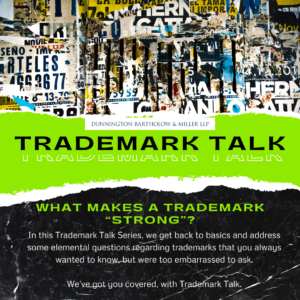Bob Marley once said “you never know how strong you are, until being strong is your only choice.” He was not talking about trademarks, but he certainly could have been. Trademarks are only as strong as their ability to sustain challenges. While you cannot anticipate all challenges ahead, you can certainly lay the groundwork to have a strong trademark. It starts by picking the right components to your mark (https://dunnington.com/trademarktalk-whatisatrademark/).
A strong trademark is an “inherently distinctive” mark. An inherently distinctive mark is a mark that clearly identifies the sources of your goods and services as coming from you. The mark is strong because it is uniquely associated to you.
The strength of a trademark will be judged on a sliding scale from weak to strong. Weak marks are descriptive or generic. For example, a generic mark would be “MILK” for milk products or “BICYCLE” for bicycles. These types of marks do not function as trademarks because they are merely the common name for the products. They do not indicate the source of the products. Examples of descriptive marks would be “CREAMY” for yogurt or “STYLISH” for a clothing line. These types of marks only describe the products without, again, indicating the source of the products.
Descriptive marks can only be registered if they have been used for an extensive period of time and therefore have become “distinctive”. This requires years of use, and the ability to prove that consumers recognize the mark as the source of the products. This can be a time consuming and expensive process. For example, BOOKING.COM went all the way to the Supreme Court of the United States to prove that it had a valid trademark for online “booking” services. It took years and, presumably, extensive legal fees to do so.
A stronger mark will be a “suggestive” mark. Suggestive marks are words that suggest some quality of the product, but do not explicitly state it. For example, “TINT TONE” for hair coloring, “SNO-RAKE” for a snow removal tool, or “NOBURST” for liquid antifreeze. These marks are suggestive because it requires some imagination or thought to reach a conclusion as to the nature of those goods. Suggestive marks are stronger marks and are considered acceptable as trademarks.
The strongest trademarks are fanciful and arbitrary marks. Arbitrary marks are words that have no association with the underlying goods or services. For example, the use of “APPLE” for a family of computers when clearly fruit has no relation to electronic equipment. Fanciful marks are invented words and only have meaning with respect to the product with which they are associated. For example, “PEPSI” for a soft drink or “EXXON” for petroleum products.
The stronger marks that are suggestive, arbitrary or fanciful will offer the best trademark protection. Of course, for every mark that you are considering you should conduct a prior search to see whether anyone is already using that mark. Find out more about trademark searches in next week’s post.



